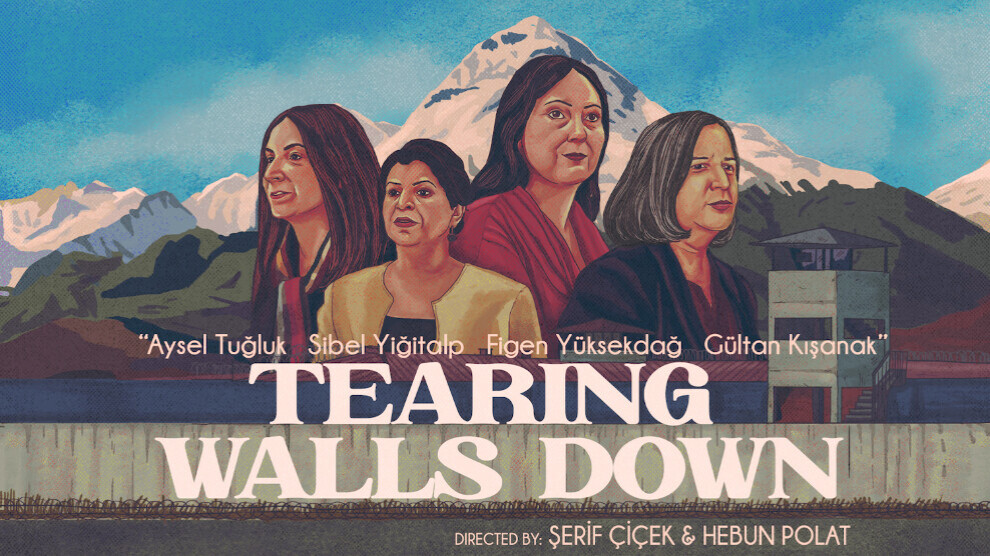Movie "Tearing Walls Down" screens in Europe
The movie "Tearing Walls Down", directed by Hebun Polat and Şerif Çiçek, continues to be screened all over Europe.
The movie "Tearing Walls Down", directed by Hebun Polat and Şerif Çiçek, continues to be screened all over Europe.

The movie "Tearing Walls Down", directed by Hebun Polat and Şerif Çiçek and produced by Adil Demirci, Onur Güler and Yeşim Coşkun, talks about four female politicians, Figen Yüksekdağ, Gültan Kışanak, Aysel Tuğluk and Sibel Yiğitalp. The film is currently screening in different European cities.
This is an interview with director Hebun Polat and producer Onur Güler.
When we look at the title of the movie, Figen Yuksekdag's book 'Tearing Walls Down' comes to mind. What is the relationship between the book and the movie?
When we started shooting the documentary, we didn't have a title in mind. However, in the following period, the books of both Figen Yüksekdağ and Gültan Kışanak were published. We read both books in detail and got the information needed for the documentary. Then, while we were discussing the title with our team, the name of Figen Yüksekdağ's book had an aspect that corresponded to the political process and also had a symbolic meaning. Figen Yüksekdağ also came from a relatively conservative family of Turkish origin, but as a revolutionary socialist woman, her struggle with the Kurdish people side by side and her election as the mayor of the city where Gültan Kışanak was tortured 40 years ago, pointed to the walls that are being demolished today. As a result, we can say that the title of the book and the story found each other.
In your previous movie, “Exile or Prison”, we have seen politicians who had to go into exile. In this film, we see female politicians. Politicians in exile and in prison.
There has always been a price to pay for doing politics in favor of the oppressed in Turkey and Kurdistan. When it comes to the demands of the workers, the laborers, the marginalized and the Kurdish people, this mechanism of oppression doubles. Dozens of parties created by the Kurdish people were shut down, thousands of politicians were arrested, people faced massacres. Of course, this oppression and bullying did not start with Figen Yüksekdağ. But in the last 7 years, it has gained a new political dimension with the attacks against the HDP, especially on 4 November 2016. As a result, hundreds of politicians were sent to prisons or forced into exile in an attempt to silence them.
People reacted to these policies by using all their democratic rights. They took to the streets. We wanted to contribute to this struggle from the field of art and convey these conditions of prison and exile to the audience. We wanted to add a new breath to the struggle, to reach the segments that we could not reach before.
In addition, Kurdish cinema, which has further established itself as a solid reality in recent years with films such as Ji bo Azadiye, Blackberry Time or Kobane, has become a way to tell different stories and reach different audiences.
Gülten Kışanak, Figen Yüksekdağ, Aysel Tuğluk and Sibel Yigitalp are Kurdish women politicians in Turkey. They are imprisoned or in exile. Four stories that show the reality of making policy in Turkey.
One of the most fundamental problems of the current Turkish system is that the Kurdish people want their collective rights. And this is a problem for the establishment. The problem of democracy in Turkey has been seriously violated. It is very difficult to do politics in Turkey, especially if you are Kurd and you engage in a democracy struggle. Thousands of people are kept in isolation in prison because of their ideas. In such a situation, we can say that doing politics and doing it with your female identity poses a threat to the Turkish state. We know that all sections of the struggle for democracy are fighting oppression, censorship and many problems in Turkey. This applies to every sector. Recently, artists, journalists, theatre actors and filmmakers have been arrested. There is an attempt to reset the social memory of a people and society. In other words, we can say that the regime wants to intimidate with fascist methods in all areas of society.
Can we get information about the film production? (Where was it filmed, how was it filmed, etc.)
Our film was produced in 10 months and shooting lasted 5 months. A team directed by Şerif Çiçek shot the filming in Europe. One of our teams shot in Turkey and North Kurdistan under the direction of Hebun Polat. We filmed Sibel Yiğitalp in Germany. We witnessed Sibel's daily life and political activities in exile. We shot Aysel Tuğluk and Sedat Şenoğlu in Istanbul. We shot the house of Kisanak in Amed. We also went to Kandıra prison a few times and managed to do some shooting there. We also filmed something in Dersim.
Did you have any difficulties during the shooting of the movie?
Of course, we had some problems. We can say that we had serious difficulties, especially on our way to Kandıra prison. We had to shoot in secret there. Because if they knew we were filming, they could have directly confiscated our technical equipment. In the end, we managed to do some filming. Apart from that, the 6 February earthquake occurred as we were filming, so we, of course, rescheduled things. After the earthquake, we regrouped the crew and completed the filming.